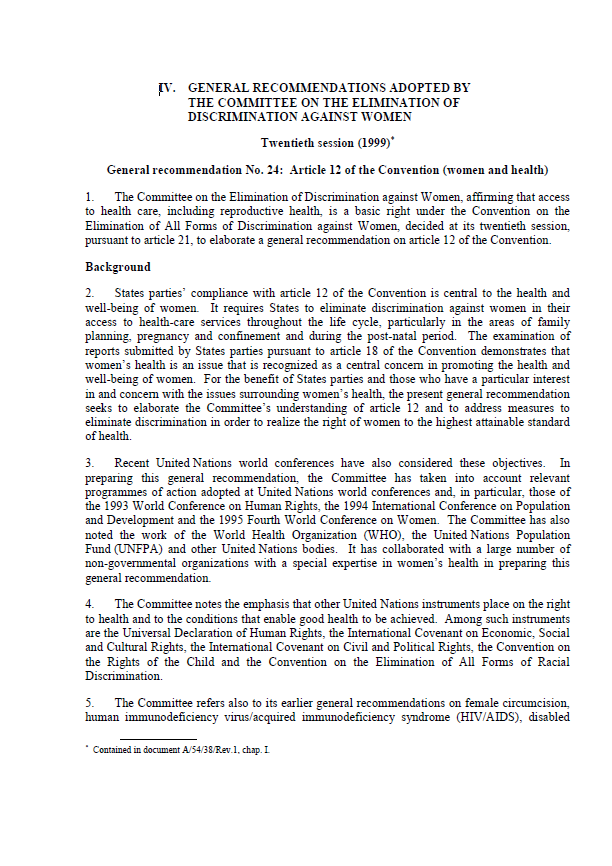1999 General Recommendation No.24 on women and health
Analysis of precedential value
The Committee on the Elimination of Discrimination Against Women (CEDAW) provides an authoritative interpretation of article 12 of the Convention on the Elimination of All Forms of Discrimination Against Women.
CEDAW is composed of 23 independent experts on women’s rights that monitor the implementation of the Covenant. It is part of the Office of the High Commissioner for Human Rights, a Secretariat body led by the UN High Commissioner for Human Rights.
Used as precedent
intersectionality
“While biological differences between women and men may lead to differences in health status, there are societal factors that are determinative of the health status of women and men and can vary among women themselves. For that reason, special attention should be given to the health needs and rights of women belonging to vulnerable and disadvantaged groups, such as migrant women, refugee and internally displaced women, the girl child and older women, women in prostitution, indigenous women and women with physical or mental disabilities.” (paragraph 6)
stigma and discrimination
“Measures to eliminate discrimination against women are considered to be inappropriate if a health-care system lacks services to prevent, detect and treat illnesses specific to women. It is discriminatory for a State party to refuse to provide legally for the performance of certain reproductive health services for women. For instance, if health service providers refuse to perform such services based on conscientious objection, measures should be introduced to ensure that women are referred to alternative health providers.” (paragraph 11)
gender norms and stereotypes
“For example, States parties should not restrict women’s access to health services or to the clinics that provide those services on the ground that women do not have the authorization of husbands, partners, parents or health authorities, because they are unmarried or because they are women. Other barriers to women’s access to appropriate health care include laws that criminalize medical procedures only needed by women punish women who undergo those procedures.” (paragraph 14)
comprehensive sexuality education
“States parties should ensure, without prejudice or discrimination, the right to sexual health information, education and services for all women and girls, including those who have been trafficked, even if they are not legally resident in the country. In particular, States parties should ensure the rights of female and male adolescents to sexual and reproductive health education by properly trained personnel in specially designed programmes that respect their right to privacy and confidentiality.” (paragraph 18)
gender equality
“As a consequence of unequal power relations based on gender, women and adolescent girls are often unable to refuse sex or insist on safe and responsible sex practices. Harmful traditional practices, such as female genital mutilation, polygamy, as well as marital rape, may also expose girls and women to the risk of contracting HIV/AIDS and other sexually transmitted diseases. Women in prostitution are also particularly vulnerable to these diseases.” (paragraph 18)
bodily autonomy and integrity
“Women have the right to be fully informed, by properly trained personnel, of their options in agreeing to treatment or research, including likely benefits and potential adverse effects of proposed procedures and available alternatives.” (paragraph 18)
